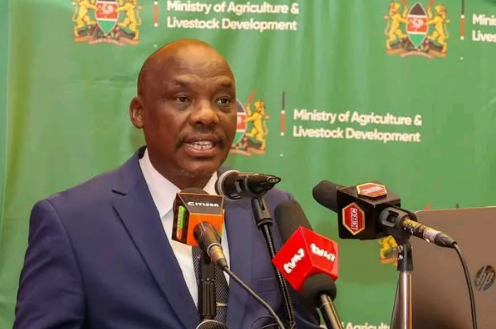
 Agriculture Principal Secretary Paul Ronoh. /FILE
Agriculture Principal Secretary Paul Ronoh. /FILE
The government has moved to calm rising anger among smallholder tea farmers following this year’s low bonuses, ruling out disbandment of the Kenya Tea Development Agency but vowing far-reaching reforms to restore confidence in the sector.
Agriculture Principal Secretary Paul Ronoh said the outcry over the 2024–25 tea bonuses was understandable but largely fuelled by factors beyond the government’s control.
He explained that the payouts were affected by decline in global tea prices, a stronger shilling, rising production costs and disposal of accumulated stocks at lower prices.
The PS said that the “disbandment of KTDA is not the solution” to these dynamics.
“What is required is comprehensive restructuring of its governance and operational framework,” the PS said in a statement released on Thursday.
“Stricter oversight of directors’ expenditures, firm limits on allowances and meetings, stronger internal controls and full financial accountability will be enforced to restore farmer trust.”
Ronoh said the government had taken note of farmers’ complaints, especially from the West of Rift region where returns were markedly lower.
He attributed the variations to market dynamics rather than discrimination, citing differences in leaf quality and production costs.
According to the ministry, the 2024–25 financial year saw tea prices drop from $2.69 to $2.46 per kilogramme even as the Kenya shilling appreciated sharply against the dollar—from Sh144.21 to Sh129.37—reducing export earnings in local currency terms.
At the same time, factories were forced to offload carry-over stocks at lower prices after the government removed the reserve price to unlock sales.
“Contrary to claims that some farmers received only Sh10 per kilo of green leaf, this represents only part of the payment,” the ministry clarified.
“Farmers have already received an initial Sh23–25 per kilo, bringing the total average payment for 2024–25 to Sh56 per kilo, with the lowest-earning factory paying Sh33.58.”
While defending the overall reforms undertaken so far, Ronoh acknowledged that governance and transparency issues within KTDA had worsened farmers’ frustrations.
“Farmers have voiced strong concerns about questionable expenditures and excessive sitting allowances running into tens of millions,” he noted.
“These weak internal controls have continued to erode confidence.”
To address these challenges, the government has outlined a raft of measures aimed at stabilising farmer incomes and enhancing tea quality.
These include the establishment of green-leaf quality standards, operationalisation of the new Tea Quality Analysis Laboratory in Mombasa, and rollout of the Strategic Tea Quality Improvement Programme (STQIP) to help factories producing lower-quality teas meet global standards.
The ministry has also directed KTDA to release Sh2.7 billion recovered from collapsed banks to tea farmers by mid-October to ease liquidity pressures.
Meanwhile, a Sh3.7 billion modernisation fund announced by President William Ruto will continue supporting factory upgrades to boost efficiency and production of high-value teas.
Ronoh emphasised that the government’s goal was to strengthen—not dismantle—the KTDA structure, while ensuring accountability.
“Only sustainable, long-term reforms will safeguard the livelihoods of smallholder tea farmers,” he said.
“Short-term reliefs are not enough. We must address systemic issues—quality, governance, cost of production and fair market access—if farmers are to truly benefit.”
The statement also highlighted a series of positive interventions already implemented to cushion farmers.
These include fertiliser subsidies that reduced prices to Sh2,500 per bag, a Sh2 billion refund on earlier fertiliser costs issued in December 2024, and the removal of taxes on tea and packaging materials through the 2025 Finance Bill to promote value addition.
The government has also expanded international market access in China, Iran, the United States, and Europe and restarted the stalled Chemosit hydropower project to lower processing costs.
More than 400,000 high-yield tea varieties have been distributed to farmers, while the government has facilitated direct sales from factories by reviewing the Tea Act 2020.
Additionally, satellite factories such as Chelal, Litein, and Motigo have been granted autonomy to enhance efficiency and responsiveness.
Ronoh said a national tea conference will be convened within two weeks to review sector performance and gather further input from farmers, processors and traders.
“The future of the tea sector depends not only on markets but also on governance that farmers can believe in,” he said, adding that the ministry, KTDA, and the Tea Board of Kenya were aligned in ensuring that the trust deficit is addressed decisively.
With tea sustaining more than 10 million Kenyans directly and indirectly, the government maintained that reforms must be deep and deliberate.
“We are determined to build a tea sector where every farmer earns a fair return for their hard work,” the PS affirmed.














